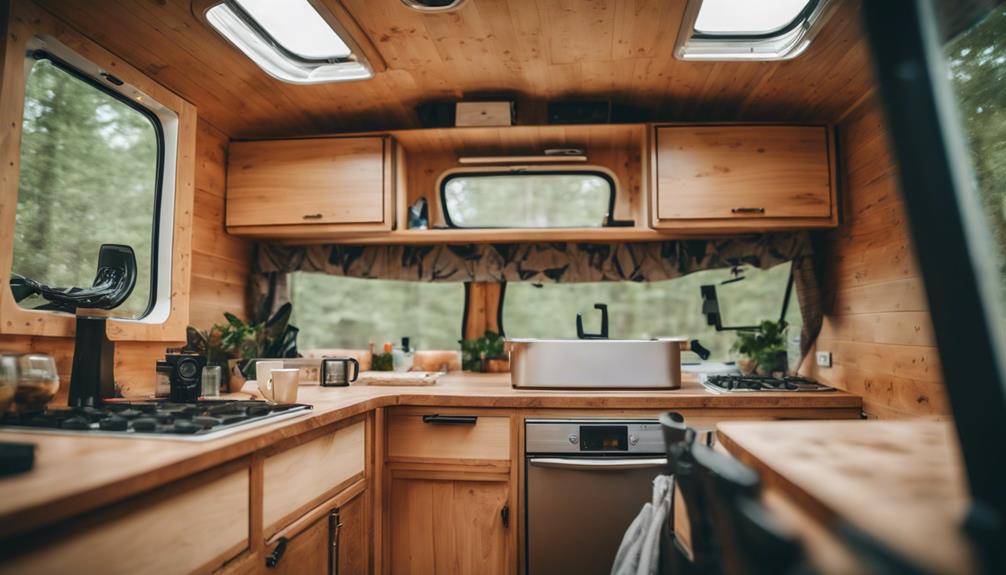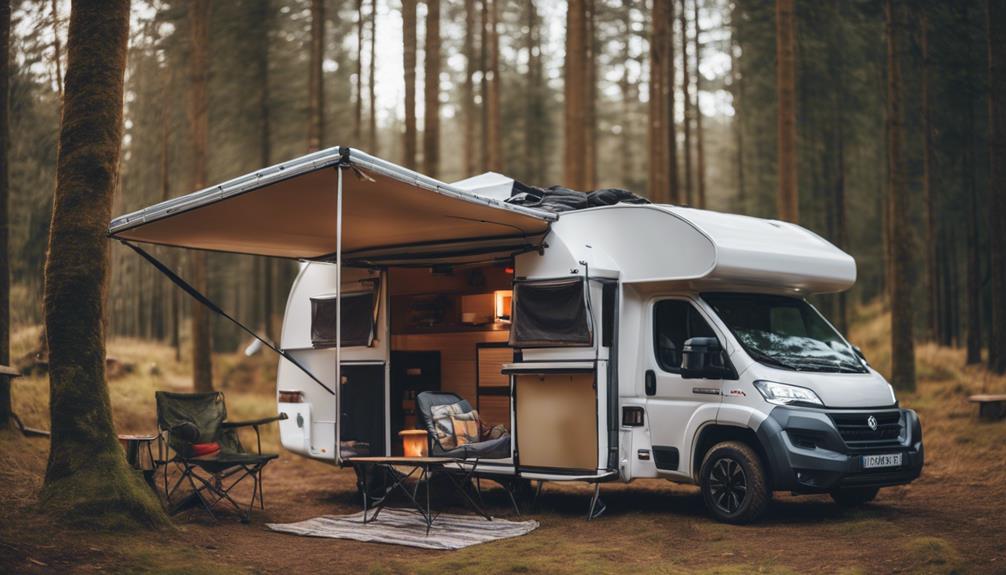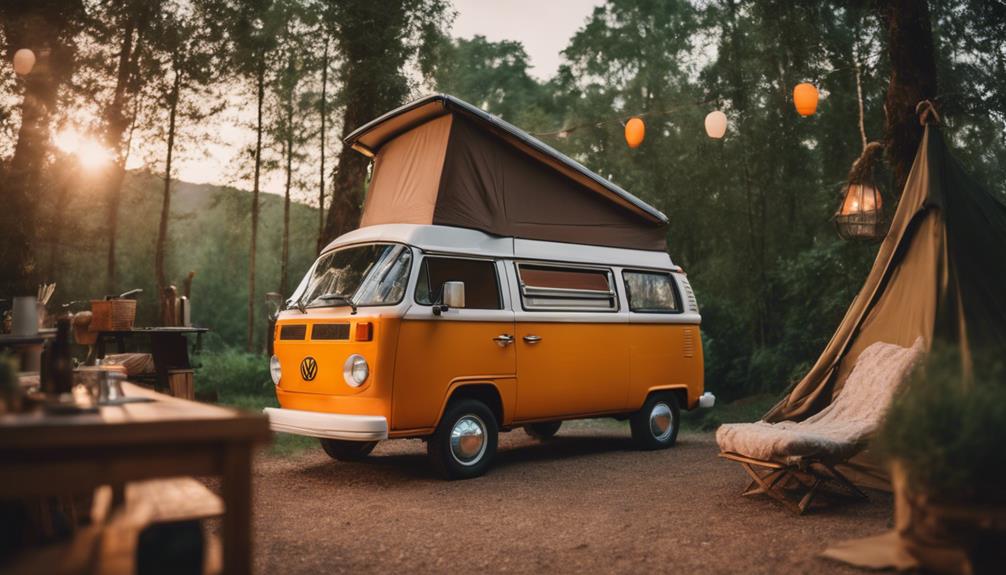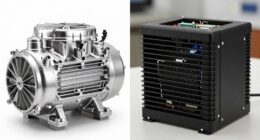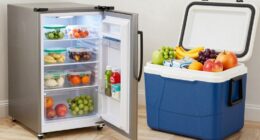The best buses for camper conversion are typically school buses, known as 'skoolies.' Look for models like International, Blue Bird, or Thomas, as they're durable and built to last. Aim for a length of at least 20 feet to guarantee you have enough living space. Opt for buses with well-maintained diesel engines, like the DT466, for longevity and efficiency. High insulation standards are essential for comfort in all climates. You want a solid foundation to create your unique mobile home. Discover more about innovative designs and features to make your skoolie conversion a success.
Introduction
When you're considering a bus for camper conversion, what factors should you prioritize to guarantee a successful transformation?
First and foremost, focus on durability. Models like International and Blue Bird are known for their robust construction, especially with rear engine configurations that maximize living space. You'll want to choose a bus that's at least 20 feet long, as longer buses often provide ample room but may require special parking.
Next, conduct a thorough inspection before purchasing. Pay close attention to rust and structural integrity, as buses from warmer climates typically fare better than those from rust belt areas.
Look for well-maintained diesel engines like the DT466 or Detroit Diesel, which are known for longevity and can exceed 500,000 miles.
Background Information
When you think about camper conversions, it's crucial to understand the history behind school bus conversions.
Over the years, a DIY skoolie culture has emerged, turning these vehicles into unique living spaces.
This transformation reflects a growing trend of sustainable travel and creative lifestyles that you might find inspiring.
School Bus Conversion History
School bus conversions, or 'skoolies,' have evolved from niche projects in the 1970s to a popular movement driven by the desire for affordable, mobile living solutions.
While the first known school bus conversions emerged in the 1970s, it wasn't until the 1990s that they gained traction, influenced by alternative living movements.
Today, skoolies are synonymous with a minimalist lifestyle, appealing to those who want to escape traditional housing costs. Many school buses are built on durable chassis, making them excellent candidates for conversion into mobile homes or camper vans. Popular models include the International, Thomas, and Blue Bird brands, especially those with rear engine configurations that provide extra living space.
As the skoolie community has grown, so have the resources available for aspiring bus lifers. Numerous conversion companies have emerged, offering specialized services to help you transform your bus into a comfortable home.
Online forums and social media groups are filled with shared knowledge, designs, and experiences, making it easier than ever for you to join the bus life movement.
With creativity and determination, a school bus conversion can be your ticket to freedom and adventure.
Emergence of DIY Skoolie Culture
In recent years, the DIY skoolie culture has exploded, attracting thousands of individuals and families enthusiastic to transform school buses into unique mobile homes. This movement focuses on creating a personalized living space that reflects your style and needs, allowing you to embrace minimalist living.
With a conversion cost averaging between $10,000 and $30,000, skoolie enthusiasts find that investing in a school bus can lead to significant savings compared to traditional housing.
The skoolie community thrives online, with countless social media accounts on platforms like Instagram and YouTube showcasing conversion journeys, tips, and tricks. As you immerse yourself in this culture, you'll discover a wealth of inspiration and support to guide your own transformation.
Popular bus models, such as International and Blue Bird, are often chosen for their durability and spacious interiors, making them ideal for conversion.
This rise in DIY skoolies reflects a broader trend of breaking free from conventional living norms. As you set off on your skoolie journey, you'll join a passionate community that celebrates creativity, adventure, and the freedom of mobile living.
Recent Skoolie Design Innovations

When it comes to skoolie conversions, recent innovations are changing the game.
You'll find that builders are using eco-friendly materials and clever space-saving designs to create more efficient and versatile living areas.
These advancements not only enhance comfort but also make your skoolie more sustainable and functional.
Eco-Friendly Materials in Conversions
Eco-friendly materials are transforming skoolie conversions, making them more sustainable and stylish than ever. By incorporating reclaimed wood, bamboo, and recycled metal, you're not just enhancing your bus's aesthetic; you're also promoting sustainability.
For insulation, consider options like sheep's wool or cotton, which provide excellent thermal performance while being biodegradable. These materials help keep your skoolie comfortable without harming the planet.
Additionally, many skoolie enthusiasts are choosing low-VOC paints and finishes. This choice minimizes harmful emissions, ensuring that your indoor air quality remains healthy.
Installing solar panels made from eco-conscious materials further boosts your energy efficiency, allowing you to travel without relying heavily on fossil fuels.
Natural fiber textiles, such as organic cotton and hemp, are becoming popular for upholstery and curtains. These materials offer durability and comfort while being environmentally friendly, making your living space both cozy and sustainable.
Innovative Space-Saving Designs
Maximizing space in a skoolie has never been easier with innovative designs that transform limited square footage into functional living areas. Recent trends focus on vertical living spaces, which allow you to create additional sleeping areas or storage solutions without sacrificing precious floor space.
Spiral staircases have become a stylish and space-efficient way to access upper living areas, minimizing their footprint while adding a modern touch.
Modular furniture plays a key role in optimizing your interior space. Foldable tables and convertible sofas enable you to adapt your living area for daily activities or guest visits without cluttering your environment. You can easily shift between relaxation and entertaining modes.
Creative storage solutions, such as cargo nets and under-bed compartments, help you keep personal items organized and within reach, contributing to a more open and inviting living space.
Additionally, advanced insulation techniques, like spray foam and foam panels, enhance temperature control while promoting a compact, efficient use of interior space.
These innovative features make it simpler than ever to create a comfortable, functional skoolie that meets your needs while maximizing every inch of your mobile home.
Engine Performance Comparisons
When considering engine performance for your camper conversion, you'll want to weigh fuel efficiency against power.
Understanding the different engine types can help you make a choice that balances your travel needs and budget.
Let's explore insights from mechanics on how these engines perform in real-world conditions.
Fuel Efficiency Versus Power
Balancing fuel efficiency and engine power is essential when choosing the best bus for your camper conversion. Diesel engines often shine in this regard, offering better fuel efficiency and impressive torque for heavy loads.
For instance, engines like the DT466 can exceed 500,000 miles, delivering around 6.5 to 9 miles per gallon, which can be beneficial on long trips. Their reliability makes them a top choice for those who want to convert a bus into a dependable home.
On the other hand, gasoline engines are generally more affordable upfront and easier to maintain, with fuel efficiency ranging from 8 to 12 miles per gallon. However, they typically last about 200,000 miles before experiencing performance issues.
If you prioritize power, V engines usually outperform inline engines, providing higher horsepower—ideal for larger camper conversions.
Ultimately, the decision between diesel and gasoline engines boils down to your specific needs. If you favor long-term reliability and torque, a diesel engine may be the way to go. But if you want lower initial costs and easier maintenance, a gasoline engine might suit you better.
Mechanic Insights on Bus Performance
Understanding engine performance differences is crucial for making an informed choice about which bus to convert into a camper, as it directly impacts your travel experience and long-term reliability.
Diesel engines, like the International DT466 and Detroit Diesel MBE906, stand out for their durability, often exceeding 500,000 miles with regular maintenance. This makes them ideal for those seeking a long-term living solution in a bus camper.
While gas engines may seem cheaper initially, their lifespan of around 200,000 miles can lead to costly replacements down the line, particularly if they show wear past 100,000 miles. When paired with the Allison 2000 transmission, diesel engines provide reliable and smooth performance, enhancing your overall driving experience.
If you're considering high-mileage buses, they can be cost-effective for conversions, but be prepared for potential overhauls or repairs due to aging components.
Additionally, diesel engines generally achieve better fuel efficiency, averaging 6.5 to 9 miles per gallon, which is crucial for budget-conscious travelers.
Ultimately, evaluating engine performance helps guarantee you'll enjoy your journey while maximizing the utility of your storage boxes and living space.
Engine Types and Efficiency
Choosing the right engine type can make or break your bus conversion project, impacting both performance and efficiency on the road.
Diesel engines, like the DT466, are known for their durability and impressive fuel efficiency, averaging 6.5 to 9 miles per gallon. In contrast, gasoline engines typically last around 200,000 miles and offer lower efficiency. If you're aiming for longevity and performance, opting for a diesel engine, such as the Detroit Diesel MBE906, is a smart choice.
Engine types also influence torque and horsepower. Inline engines generally require fewer modifications for bus conversions, making them easier to work with than V engines, which provide higher horsepower but can complicate your build. Pairing a diesel engine with an Allison 2000 transmission enhances the driving experience, ensuring reliable performance and smooth shifting.
Regular maintenance is essential for maintaining fuel efficiency and extending the lifespan of your engine. By prioritizing engine care, you can enjoy a seamless and efficient driving experience in your camper conversion, allowing you to focus on the adventures ahead.
Essential Tools for Conversion
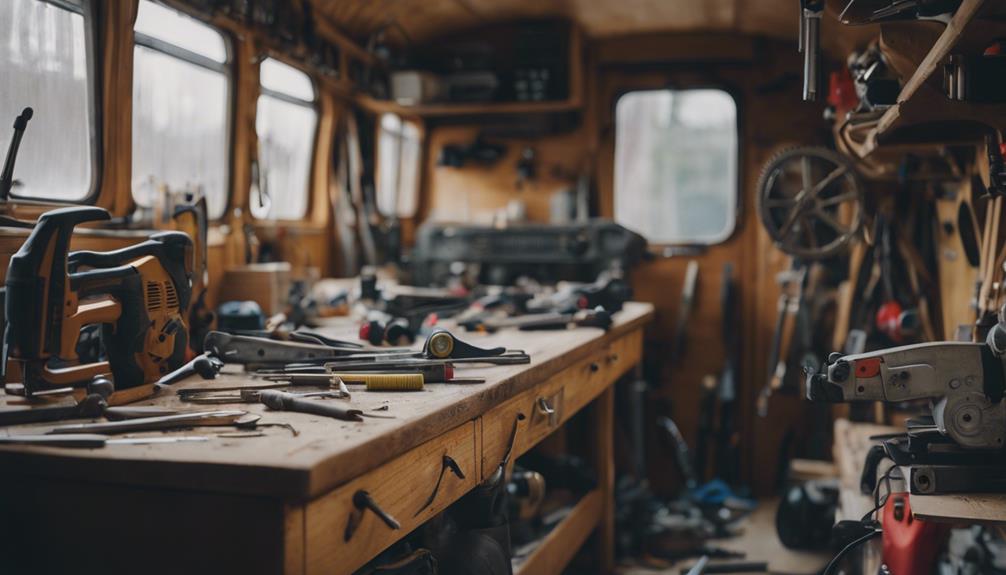
When you start your bus conversion, having the right tools is vital for a smooth process.
Along with understanding the conversion steps, you'll want to prioritize safety standards to protect yourself throughout the project.
Let's explore the essential tools you'll need to make your camper conversion a success.
Conversion Process Overview
Equipping yourself with the right tools is vital for a successful bus conversion, guaranteeing you can tackle every aspect of the project efficiently.
When creating your bus home, you'll want to have a circular saw for cutting wood and materials, a drill for assembling components, and a jigsaw for those intricate cuts in tight spaces. A level is critical for verifying surfaces are even, while a measuring tape helps you accurately plan your floor plan and fit furniture according to your personal preference.
Don't forget safety equipment like goggles, gloves, and a dust mask to protect yourself from debris while you work. A multi-tool or oscillating tool can be invaluable for sanding, cutting, and scraping in hard-to-reach areas. Having an extensive toolset, including wrenches, screwdrivers, and pliers, will also be essential for mechanical repairs and adjustments when dealing with the bus's systems.
With the right tools, you'll not only make the conversion process smoother but also create a comfortable space that you can drive around in full-time. It's a good idea to invest in quality tools to guarantee your bus conversion is both effective and enjoyable.
Safety Standards for Conversions
Adhering to safety standards during your bus conversion is vital to creating a secure and livable space. First, make certain your conversion complies with local safety regulations, including fire safety codes and electrical system standards. This guarantees your living environment is safe and reliable.
Use high-quality materials for insulation, wiring, and plumbing. This choice prevents hazards like electrical fires, mold growth, and water damage. Installing smoke detectors and carbon monoxide detectors is essential; place them strategically to provide early warnings in emergencies.
Don't overlook the vehicle's mechanical safety. Regularly check and maintain the braking system, tires, and engine, especially since the added weight from your conversion can affect handling.
For complex installations, consider hiring professional services. Experts in electrical and plumbing systems can help you meet safety standards and minimize risks often associated with DIY conversions. Their knowledge can save you time, effort, and potential hazards.
What Makes Ford Transit a Good Option for Camper Conversion Compared to Other Buses?
When it comes to reliable camper conversion builds, the Ford Transit stands out as a top choice compared to other buses. Its spacious interior, durable components, and wide availability of aftermarket parts make it an ideal candidate for creating a comfortable and functional camper van that will last for years of adventure.
Is the Ford Transit a Suitable Option for Turning Into a Camper Conversion?
The ford transit camper conversion reliability is well-regarded among camping enthusiasts. With its spacious interior and robust build, the Ford Transit is a suitable option for turning into a camper conversion. Its proven reliability makes it a popular choice for those looking for a dependable and comfortable camping experience.
Conclusion
In summary, selecting the right bus for your camper conversion sets the foundation for a successful and enjoyable adventure on the road. A bus would ideally provide ample space, allowing you to plan an efficient layout that includes sleeping, cooking, and bathroom facilities.
When you figure out what kind of bus suits your needs, consider models from International, Thomas, or Blue Bird, as their rear engine flat nose configurations offer peak space and maneuverability.
Keep in mind that the bus's engine type plays a significant role in durability and maintenance. Diesel engines like the DT466 are preferred due to their longevity. Conducting due diligence through thorough inspections for mechanical issues and structural integrity is critical. This step helps you avoid the potential costs of repairs on buses with hidden damage.
Additionally, remember that high insulation standards are essential for comfort in varying weather conditions. Incorporate effective insulation methods to guarantee temperature stability, maximizing livability within your converted bus.
Frequently Asked Questions
Is It Cheaper to Renovate a Bus or Buy an Rv?
It's usually cheaper to renovate a bus than to buy an RV. While initial costs vary, renovation offers more living space and customization, making it a more economical choice for your travel needs.
How Much Does It Cost to Convert a Bus Into a Tiny House?
Converting a bus into a tiny house typically costs between $20,000 and $60,000. Factors like renovations, mechanical repairs, and custom interiors influence your budget, so plan carefully to keep expenses manageable.
Is It Worth Converting a School Bus Into an Rv?
Absolutely, converting a school bus into an RV is worth it. You'll enjoy a unique, spacious living environment, build lasting memories on the road, and save money compared to buying a new RV.
Is a Bus Better Than an Rv?
A bus often offers more space, durability, and customization options compared to an RV. You'll find it easier to create a comfortable living area while potentially saving money on both purchase and conversion costs.
Conclusion
To wrap things up, choosing the best bus for your camper conversion can transform your travel experience into a cozy home on wheels.
With innovations in skoolie designs and a variety of engine performance options, you've got plenty of choices to fit your needs.
Don't forget the essential tools to make your conversion smooth and efficient.
Immerse yourself in this exciting project, and soon you'll be hitting the road with your personalized, comfortable living space ready for adventure!



